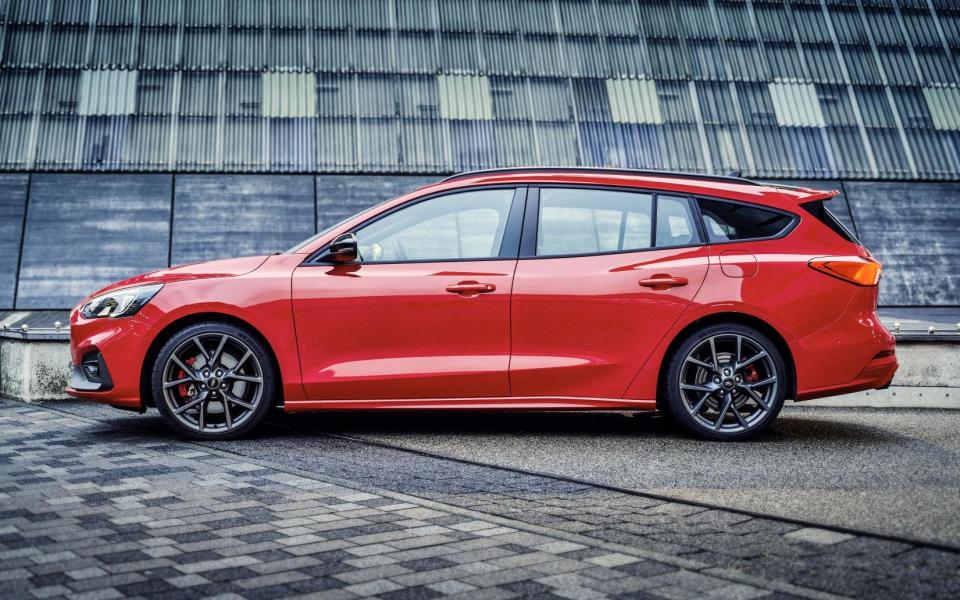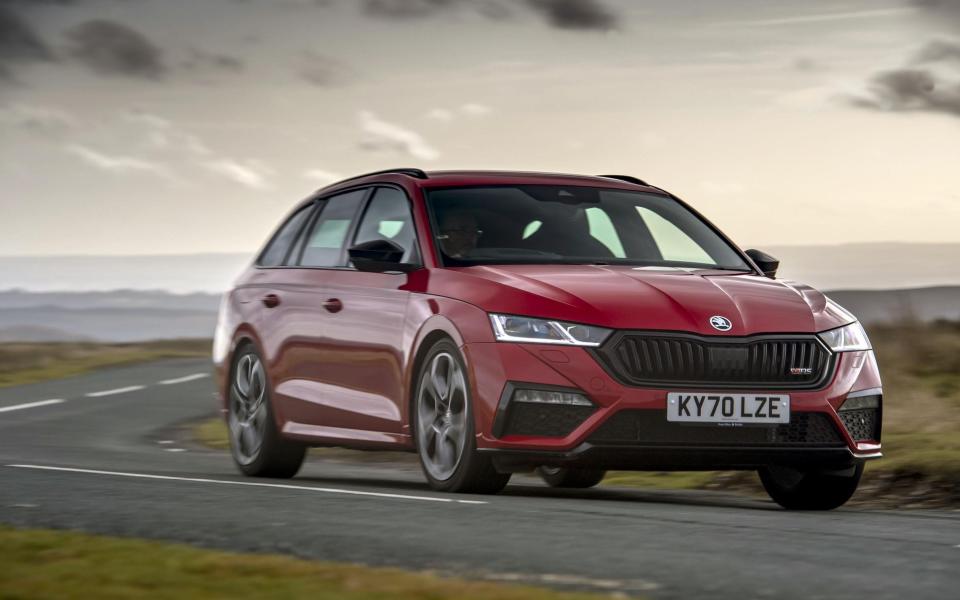Cupra Leon Estate review: here’s why you’ll have more fun in the hatchback

There’s something about a fast estate car, isn’t there? Perhaps, as one well-known motoring writer put it once, it’s to do with the perversion of a worthy vehicle designed expressly for practicality into something devilishly sporting. He might have had a point.
Whatever the case, the arrival of a new fast estate is generally A Good Thing. And therefore it was with a sense of excitement that your humble correspondent grabbed the keys to the new Cupra Leon Estate.
Cupra? Yes, well, it’s the age-old story. Conglomerate (VW) buys subsidiary (Seat); subsidiary creates performance car badge (Cupra) that becomes much loved; much-loved performance car badge is then spun off as a brand in its own right, to become a subsidiary of the subsidiary. I think that about covers it.
So this is no longer a Seat Leon Cupra, but a Cupra Leon, and if you’ve been paying attention you might be aware that the hatchback model is one of our favourite new hot hatches. Surely, then, the estate should be just as good.
Pros
Devastatingly quick
Incredible traction and grip
Immensely practical
Cons
Not quite as deft as the hatchback
Awful entertainment system
High price
Estate of the art
Actually, that isn’t quite as much of a foregone conclusion as you’d think, because in estate form the Cupra is actually a surprisingly different beast to the hatchback.

The reason for that is, quite simply, the way the cogs mesh together at the Volkswagen Group. You see, the Leon hatchback is based on the latest Volkswagen Golf GTI, which means it’s two-wheel drive and available in either 242bhp or 296bhp forms, or as a 242bhp plug-in hybrid.
The estate version can be had with the latter powertrain, too, but if you order the petrol-only model, you don’t get a hatchback with a bigger boot, as you might expect. Instead, what you get is a re-clothed Volkswagen Golf R. That means it gets four-wheel drive and 306bhp, not to mention a subtly different suspension and steering set-up to the hatchback. Like the hatchback, though, there’s no manual option – a twin-clutch auto is standard.
What’s more, you can’t have the Estate in entry-level VZ1 form. So the range starts with the VZ2 model we’re testing here, of which the petrol version will set you back a shade south of £38,500; the VZ3, meanwhile, breaches the £40,000 threshold, meaning it’ll land you with a whopping additional tax bill in years two to five of your ownership.
Estate of the nation
All of this is, of course, a lot of money, but it’s just about justifiable. After all, the Golf R will likely cost you even more (prices haven’t been announced yet, but are expected to start at £41,000 or so).
And while the Focus ST Estate, the Leon’s only other direct rival, will cost you more than £2,000 less even when you order it with an automatic gearbox, it also carries a 30bhp deficit and doesn’t come with four-wheel drive. For all that, it’s no more economical than the other two, either.
Mind you, if the Cupra does feel like too much cash, there’s always the Skoda Octavia vRS. This is actually closer to being an estate version of the Leon hatchback than the Leon estate is, being two-wheel drive and coming with the 242bhp petrol engine. The result is that it’ll set you back a mere £34,000, or thereabouts – a price which has you wondering somewhat wistfully how little a two-wheel-drive, 296bhp Leon Estate would cost, if it existed.
Climb aboard and the disparities between the Estate and the hatchback disappear. Well, almost – interestingly, the Estate gets a slightly different steering wheel, with a start/stop button and a drive mode selector, presumably because the GTI’s wiring loom doesn’t allow it whereas the R’s does.

The drive mode selector in particular proves to be more of an important distinction than it sounds, because one of the most annoying characteristics of the hatchback is the necessity to delve into the menus on the central touchscreen to change the drive mode from ‘Normal’ to ‘Sport’ when you fancy a bit of fun. In the estate, you can do it with a couple of easy button-presses.
I’m not sure who at VW might be in a position to enable Seat to incorporate this feature into the hatchback, but if anyone is I implore them to do so, because it makes a whopping difference. Suddenly, you can take advantage of a clear bit of road at a moment’s notice, rather than having to find your way through the fiddly, laggy touchscreen system to do so.
Getting in estate
That touchscreen is probably the worst thing about the Leon in hatchback form, so it follows that the same applies here. The menu system is unintuitive, the icons hard to work out, and the array of different ways to interact with it means you’re swiping up, down, left and right all over the shop. And of course, now and again it glitches, freezes, or decides it doesn’t fancy responding to your inputs. All of which, as you can imagine, is a recipe for frustration.
Happily, the rest of the interior is largely a success. Sure, there are some cheap plastics here and there, just as you’d find in the standard Leon, but the interior is lifted by the addition of some posh-feeling materials and little bronze accents smattered about the place.

There’s plenty of room in the front and even more in the back, while the boot in the petrol version is positively voluminous – bigger than the Golf’s, and almost as vast as the cavernous Octavia’s (though, as with most plug-ins, the hybrid model has to make do with less luggage space, to make room for the battery).
Thumb that big starter button, and the estate fires into life with the sort of bellicose parp you’ll find in most modern hot hatches. Flick the stubby little gear selector down into Drive, and the Leon moves off easily and with little fuss.
Estate of play
You get adjustable suspension as standard with the Estate, and as with the hatchback, the system allows a sliding scale of settings from Comfort to Sport. But the Estate’s damping isn’t quite as subtle.
It a fraction softer than the hatch’s, and does a very good job of flattering a very faultless piece of road, ironing out what few bumps might be there, but the minute the surface becomes more degraded, a less comfortable vertical bounce and a degree of lateral sway find their way in, which makes the Leon Estate feel, if not uncomfortable, then just a touch less supple than the hatchback.
The way the Estate tackles corners is different, too. Where the hatchback is all nose, its front wheels sniffing out the best grip and hauling you round the bend, daring you to pile on the power with their unstinting traction and grip, the estate feels much more as though it’s turning you bodily, pivoting about a point somewhere in the centre of the car.
The result is imperious, though; that four-wheel-drive system means traction is never, ever an issue in the dry, and even in the wet you really have to be pushing hard to find the point at which the Leon Estate will break away.

This sense of overwhelming ability is matched to the engine, a solid two litres of muscle that make the Cupra Leon feel blisteringly, effortlessly quick. A sub-5-second 0-62mph time is fast by any stretch, but in an estate? Just a few short years ago, you’d have had to have paid megabucks for an Audi RS6 to get that.
Whether you ask for grunt at the low end, in the mid range, or up top, it’s there; thump the throttle to the floor and it doesn’t really matter where you’re point the steering wheel or what the road conditions are like – the Leon Estate simply works out how best to deploy its power and hurls you down the road with as much ferocity as it possibly can.
But – and there is a but here – we drove it back-to-back with the hatchback, and couldn’t help but come away just a touch disappointed. For the final layer of finesse that the hatchback can offer – the subtlety to the steering, the adjustability in the chassis and the nth degree of sensation – all are less obvious here.
The Leon Estate is devastatingly effective thanks to all that power and traction – but the payoff is that it’s less playful, and more one-dimensional, than the hatchback.
The Telegraph verdict
Having said all that, these are very subtle differences. And they don’t detract from the fact that, in isolation, the Cupra Leon Estate is a magnificent bit of kit; a car that truly manages to be one for all seasons and all reasons.
It’s blisteringly fast, remarkably spacious, and while it doesn’t come cheap, neither is it bad value when you look at what you get for your money. It’s pretty economical for a car with all that power and four-wheel drive, and it’s even a pleasant place to be, save for that infotainment system of course.
There’s just a whiff of an opportunity missed here, though, because with the 292bhp two-wheel-drive powertrain and suspension setup from the hatchback, this would likely be an even better car. As it is, though, it’s still one of the finest fast estates on the market – and that makes it alright by us.
The facts
Cupra Leon 2.0 TSI 310 4Drive VZ2 Estate DSG
How much? £38,475 on the road
How fast? 155mph, 0-62mph in 4.9sec
How economical? 34.4mpg (WLTP Combined)
Engine/gearbox: 1,984cc four-cylinder petrol with 306bhp, seven-speed twin-clutch automatic gearbox, four-wheel drive
The electric bits: N/A
Electric range: N/A
CO2 emissions: 186g/km
VED: £895 first year, then £155
Warranty: 3 years / 60,000 miles
Boot size: 620 litres
Spare wheel as standard: No (not available)
The rivals
Volkswagen Golf R Estate
306bhp, TBCmpg, £41,000 on the road (est)

Cupra has stolen a march on its parent company by sneaking out the Leon Estate ahead of its Volkswagen-badged sibling, the Golf R. Chances are it’ll be very similar to drive, with similarly irritating entertainment, but more expensive to buy. If that’s the case, the Cupra will probably be the better buy.
Ford Focus 2.3 EcoBoost 280 ST Estate Automatic
276bhp, 34.9mpg, £36,135 on the road

The Focus ST does without four-wheel drive, and it’s a bit down on power compared with the Cupra. But it’s lighter, feels just a bit more nimble, and of course, it’s cheaper too. If you’d rather the deftness of a fast front-driver, it’s the one to have – but you do have to make do with an interior that feels straight out of the bargain bin.
Skoda Octavia 2.0 TSI 245 vRS DSG Estate
242bhp, 40.4mpg, £34,170 on the road

It does without the Leon’s all-conquering four-wheel-drive system and phenomenal power, but in its place the Octavia is lighter, more deft and somehow simpler, too. It’s also quite a bit cheaper to buy, with better fuel consumption. And of course, this is an Octavia, so its boot is even bigger.
For new and used buying guides, tips and expert advice, visit our Advice section, or sign up to our newsletter here
To talk all things motoring with the Telegraph Cars team join the Telegraph Motoring Club Facebook group here

 Yahoo News
Yahoo News 